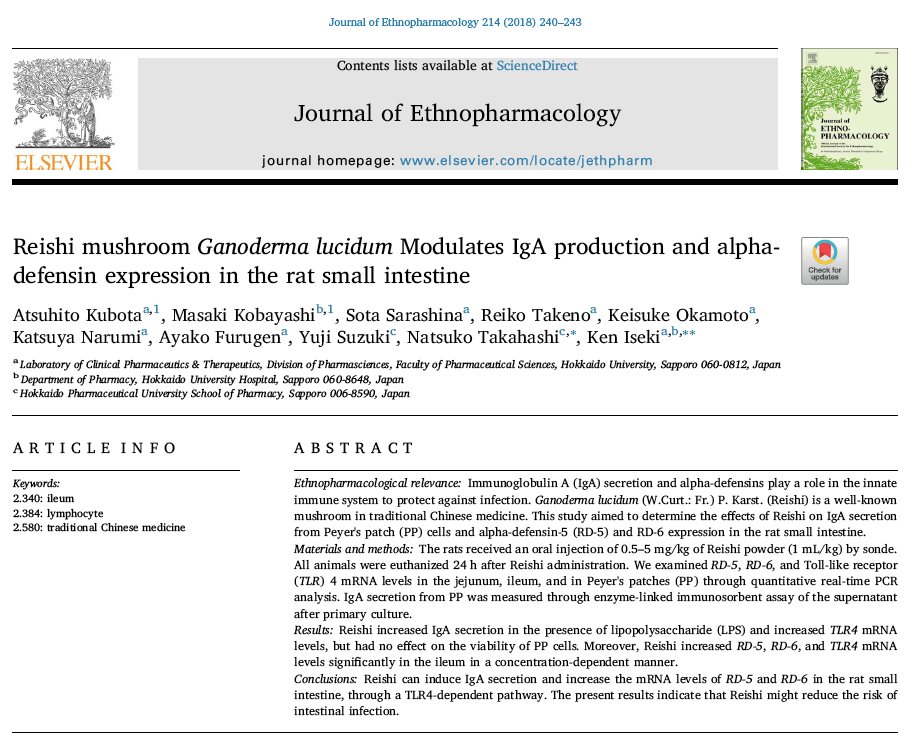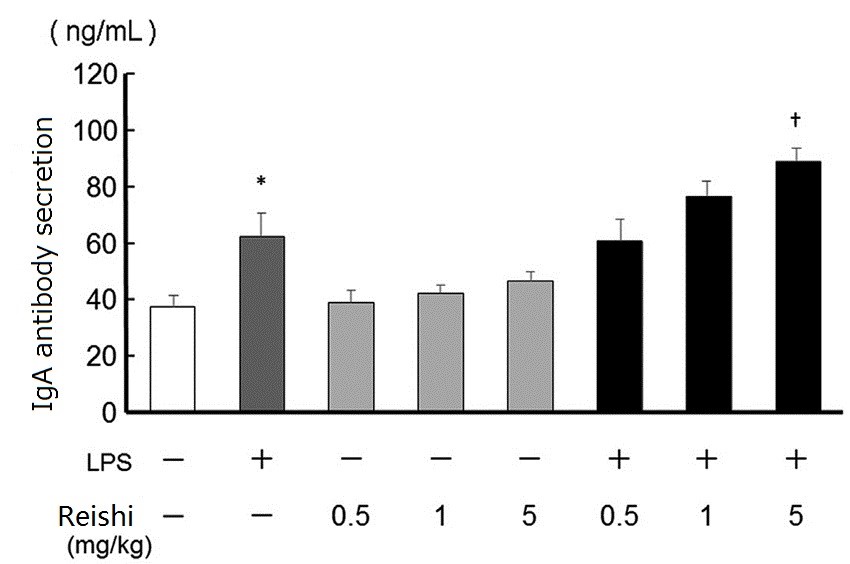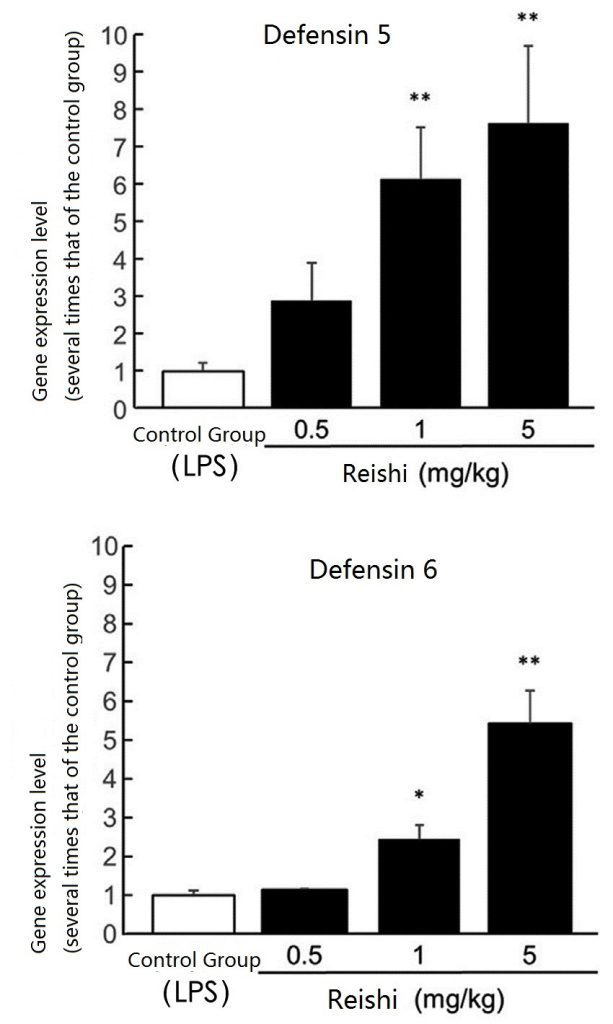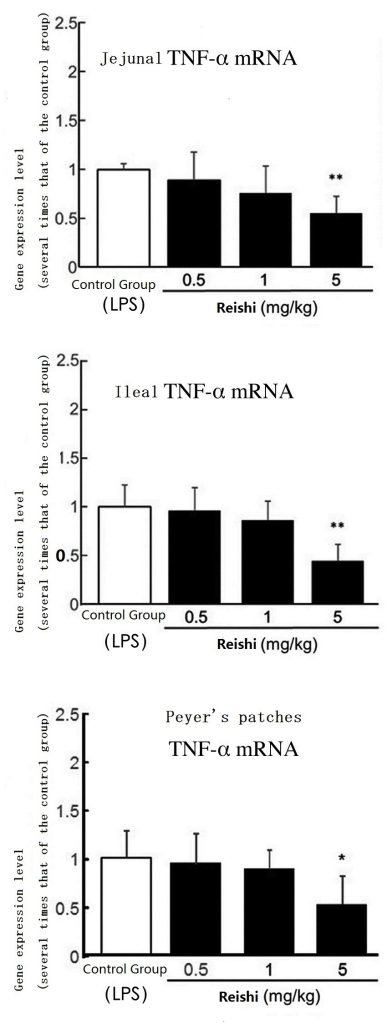行進 25, 2018/Hokkaido University & Hokkaido Pharmaceutical University/Journal of Ethnopharmacology
Text/ Hong Yurou, 呉廷耀

IgA antibody and defensin are the first line of immune defense against external microbial infections in the intestines. According to a study published by Hokkaido University and Hokkaido Pharmaceutical University in the Journal of Ethnopharmacology in December 2017,マンネンタケ can promote the secretion of IgA antibodies and increase defensins without causing inflammation. It is obviously a good helper for improving intestinal immunity and reducing intestinal infections.

When pathogenic bacteria invade, マンネンタケ will increase the secretion of IgA antibodies.
The small intestine is not only the digestive organ but also the immune organ. In addition to digesting and absorbing nutrients in food, it also defends against various pathogenic microorganisms that come in from the mouth.
したがって, in addition to the countless villi (栄養素を吸収する) on the inner lining of the intestinal wall, there are also lymphatic tissue called “Peyer’s patches (PP)” in small intestine, which serve as immune goalkeepers. Once pathogenic bacteria are discovered by macrophages or dendritic cells in Peyer’s patches, it will not take long for B cells to secrete IgA antibodies to capture pathogenic bacteria and build the first firewall for the intestinal tract.
Studies have confirmed that the greater the secretion of IgA antibodies, the more difficult it is for pathogenic bacteria to reproduce, the weaker the mobility of pathogenic bacteria, the harder it is for pathogenic bacteria to pass through the intestine and enter the bloodstream. The importance of IgA antibodies can be seen from this.
In order to understand the effect ofマンネンタケ on IgA antibodies secreted by Peyer’s patches in the wall of the small intestine, researchers from Hokkaido University in Japan took out Peyer’s patches in the wall of the small intestines of rats and then separated the cells in the patches and cultured them with the lipopolysaccharide (LPS) from Escherichia coli for 72 時間. It was found that if a considerable amount ofマンネンタケ was given during this period, the secretion of IgA antibodies would be much higher than that without Ganoderma lucidum – but low-doseマンネンタケ had no such effect.
しかし, under the same conditions of time, if only the Peyer’s patches cells are cultured withマンネンタケ without the stimulation of LPS, the secretion of IgA antibodies will not be particularly increased (下の図に示すように). 明らかに, when the intestine is facing the threat of external infection, マンネンタケ can increase the defense level of the intestine by promoting the secretion of IgA, and this effect is proportional to the dose ofマンネンタケ.

の効果マンネンタケ on the secretion of antibodies by lymph nodes of the small intestine (Peyer’s patches)
[注記] The “-” at the bottom of the chart means “not included”, and “+” means “included”. LPS comes from Escherichia coli, and the concentration used in the experiment is 100μg/mL; マンネンタケ used in the experiment is a suspension made of ground dry Reishi mushroom fruiting body powder and physiological saline, and the experimental doses are 0.5, 1, そして 5 mg/kg, それぞれ. (出典/J Ethnopharmacol. 2017 12月 14;214:240-243.)
マンネンタケ usually also improves expression levels of defensins
Another important role in the forefront of intestinal immunity is the “defensin”, which is a protein molecule secreted by the Paneth cells in the small intestine epithelium. Merely a small amount of defensin can inhibit or kill bacteria, fungi and certain types of viruses.
Paneth cells are mainly concentrated in the ileum (the second half of the small intestine). According to the animal experiment of the study, in the absence of LPS stimulation, rats were administered intragastricallyマンネンタケ (at the dose of 0.5, 1, 5 mg per kg body weight) のために 24 時間, the gene expression levels of defensin-5 and defensin-6 in the ileum will increase with the increase of theマンネンタケ 用量, and are higher than the expression levels when stimulated by LPS (下の図に示すように).
明らかに, even in peaceful times when there is no threat of pathogenic bacteria, マンネンタケ will keep the defensins in the intestines in a state of combat readiness to respond to emergencies at any time.

The gene expression levels of defensins measured in the rat ileum (the final and longest segment of the small intestine)
マンネンタケ does not cause excessive inflammation
In order to clarify the mechanism by whichマンネンタケ activates immunity, the researchers focused on the performance of TLR4. TLR4 is a receptor on immune cells that can identify foreign invaders (such as LPS), activate the message-transmitting molecules in immune cells, and make immune cells respond.
The experiment found that whetherマンネンタケ promotes the secretion of IgA antibodies or increases the gene expression levels of defensins is closely related to the activation of TLR4 receptors – TLR4 receptors are the key forマンネンタケ to enhance intestinal immunity.
Although activating TLR4 can improve immunity, over-activation of TLR4 will cause immune cells to continuously secrete TNF-α (tumor necrosis factor), causing excessive inflammation and posing a health threat. したがって, the researchers also tested TNF-α levels in the small intestine of rats.
It was found that TNF-α expression and secretion levels in the anterior and posterior segments of the small intestine (jejunum and ileum) and in the Peyer’s patches on the intestinal wall of rats were not particularly increased whenマンネンタケ was administered (下の図に示すように), and high doses ofマンネンタケ could even inhibit TNF-α.
のマンネンタケ materials used in the above experiments are all prepared by grinding driedマンネンタケ fruiting bodies into fine powder and adding physiological saline. The researchers said that because theマンネンタケ used in the experiment contains ganoderic acid A, and past studies have shown that ganoderic acid A can inhibit inflammation, they speculate that in the process of enhancing intestinal immunity byマンネンタケ 多糖類, ganoderic acid A may well have played a balancing role at the right time.

TNF-α gene expression measured in various parts of the small intestine of rats
[ソース] Kubota A, et al. Reishi mushroom Ganoderma lucidum modulates IgA production and alpha-defensin expression in the rat small intestine. J エスノファーマコール. 2018 3月 25;214:240-243.
終わり
著者について/Mさん. 呉廷耀
ウー・ティンヤオ氏は、以来、霊芝に関する直接の情報を報告し続けている。 1999. 彼女はの著者です霊芝による治癒 (4月に人民医学出版社に出版 2017).
★ This article is published under the exclusive authorization of the author.
★上記作品は転載禁止です, excerpted or used in other ways without the authorization of the author.
★上記記載事項に違反した場合, the author will pursue relevant legal responsibilities.
★この記事の原文はWu Tingyaoが中国語で執筆し、Alfred Liuが英語に翻訳しました。. 翻訳に齟齬があった場合 (英語) そしてオリジナル (中国語), 本来の中国人が勝つだろう. 読者に質問がある場合, 原作者に連絡してください, MS. 呉廷耀.



